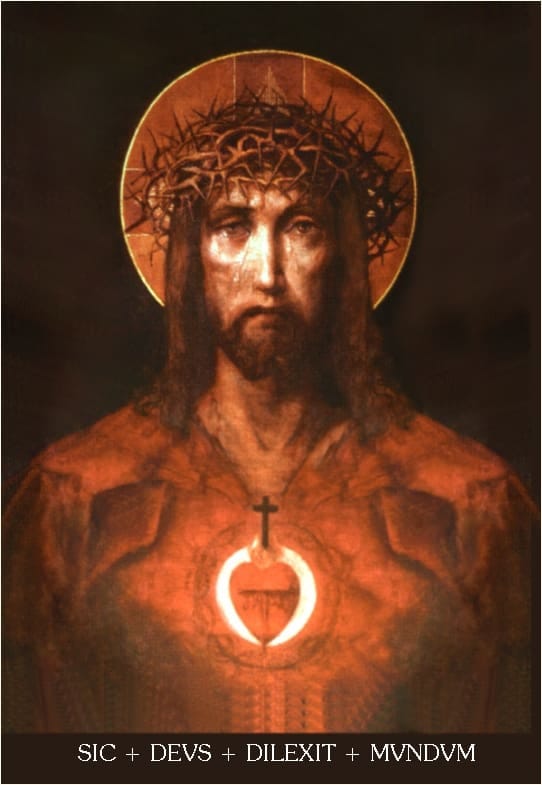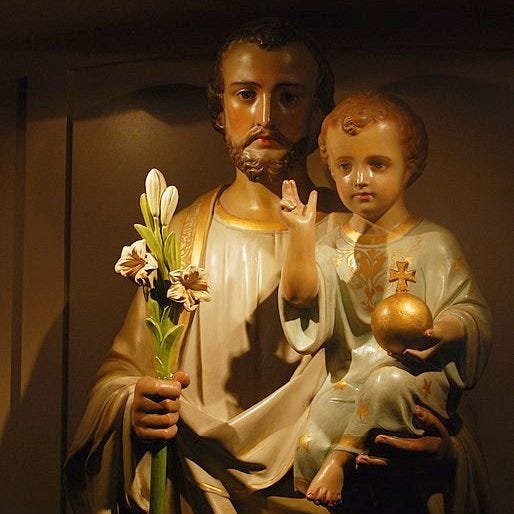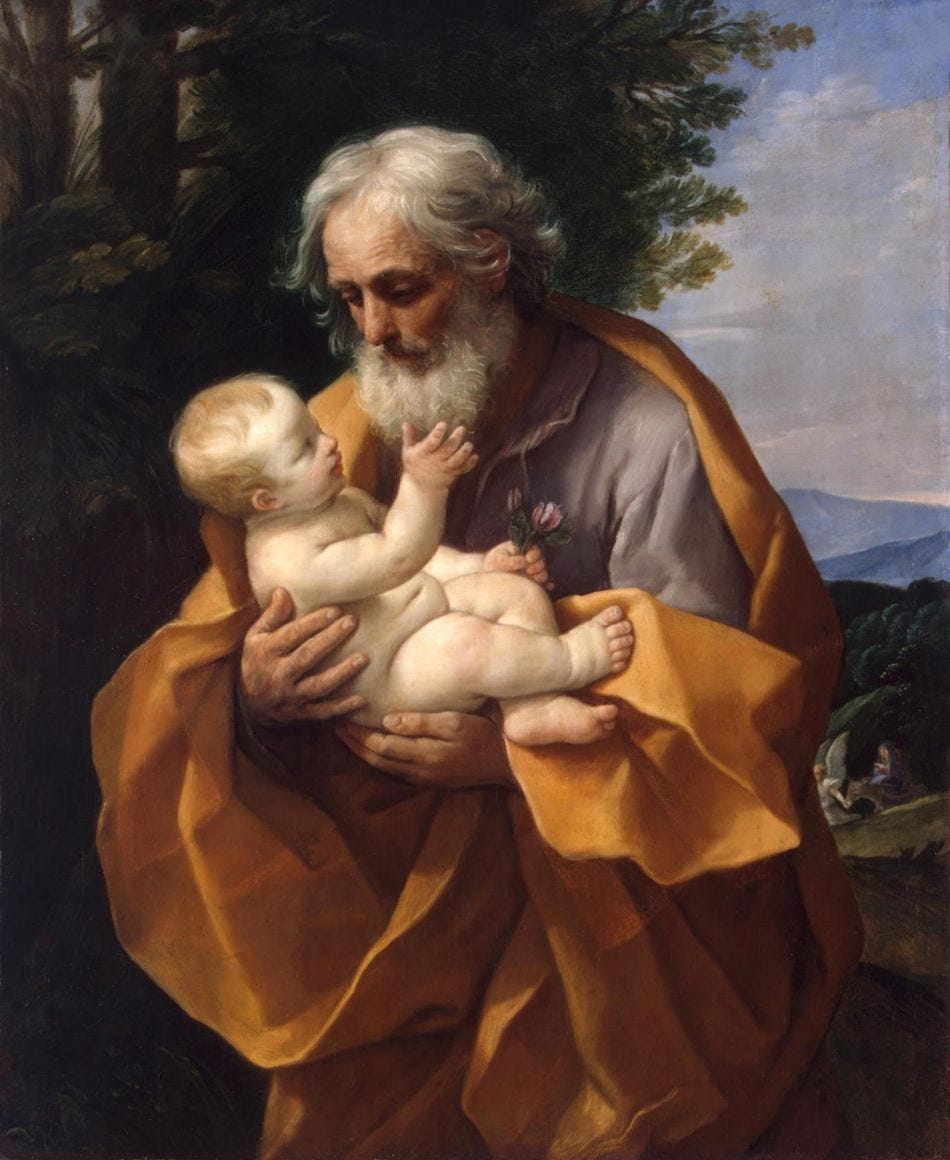We have thus far lived out the drama of Christ's earthly life -- His Nativity at Christmas, His revealing Himself as God at the Epiphany, His time in the desert at Lent, His Passion and Resurrection at Good Friday and Easter. We recalled His glorious Ascension, and at last week's Pentecost, the Holy Ghost has descended upon the Church, sent by the Father and the Son.
God's Triune Nature has been fully revealed, and now we celebrate the Most Holy Trinity on this day, hearing in today's Gospel, "All power is given to Me in heaven and on earth. Going therefore, teach ye all nations, baptizing them in the Name of the Father and of the Son and of the Holy Ghost. Teaching them to observe all the things whatsoever I have commanded you; and behold I am with you all days even to the consummation of the world" (this is known as the "Great Commission").
And with this Mass, Paschaltide ends, and the Time After Pentecost -- the season that represents the Church Age -- begins. Vestments today will be white, and the Angelus returns, replacing the Regina Coeli of Paschaltide.1
Symbols for the day include the shamrock used by St. Patrick to explain the Trinity to the ancient Irish, the pansy -- Viola tricolor -- called the "Trinity Flower," a candle with 3 flames, the triangle, the trefoil, 3 interlocking circles, etc. The "Shield of the Trinity" -- also known as the "Scutum Fidei" -- is a very old symbol for God, one which explains these words from the Athanasian Creed (see below): "we worship one God in the Trinity and the Trinity in unity. Neither confounding the Persons, nor dividing the substance. For there is one Person of the Father, another of the Son, another of the Holy Spirit." Here it is in both Latin and English:
In Italy, many Catholics make pilgrimage to the Santuario della Santissima Trinità in Vallepietra, Lazio, about 35 miles East of Rome. The sanctuary (which was among St. Philip Neri's favorites) is built in a grotto halfway up the slope of Mt. Autore -- one of the Sambruini Mountains. There, a miracle occurred in the 11th century: a farmer saw two oxen fall with their plow into a deep precipice. He went after them, expecting to find the animals dead, but he found them unharmed instead -- and gazing at an image of the Trinity that suddenly appeared on a rock. A church was built on the site, and pilgrims have been coming ever since. There is a set of 33 stairsteps at the church's entrance: one enters the church in the normal way, but one leaves the church walking down the steps backwards, in honor of the Most Holy Trinity. If you visit the place on the Feast of the Trinity, you might see il pianto delle zitelle 1 -- "the lamentations of the virgins" -- a late 17th/early 18th. century dramatic representation of Christ's Passion given by a group of women dressed in white and holding symbols of the Passion (the chalice, the ropes, the hand, the column, the lashes, the crown of thorns, the nails, the gall, the spear, the cross, etc.), with one in black representing the Madonna.
The Gift of Wisdom
The second favor destined by the Holy Ghost for the soul that is faithful to him in action is the gift of Wisdom, which is superior to that of Understanding. The two are, however, connected together, inasmuch as the object shown by the gift of Understanding is held and relished by the gift of Wisdom. When the Psalmist invites us to draw nigh to God, he bids us relish our sovereign good: Taste, says he, and see that the Lord is sweet! Holy Church prays for us, on the Day of Pentecost, that we may relish what is right and just—recta sapere—because the union of the soul with God is rather an experience or tasting, than a sight, for such sight would be incompatible with our present state. The light given by the gift of Understanding is not intuitive; it gladdens the soul, and gives her an instinctive tendency to the truth—but its own final perfection depends upon its union with Wisdom. which is, as it were, its end.
Understanding, therefore, is light; Wisdom is union. Now, union with the sovereign good is attained by the will, that is, by love, which is in the will. Thus, in the angelic hierarchy, the Cherubim with their sublime intellect are below the Seraphim, who are inflamed with love. It is quite true that the Cherubim have ardent love, and the Seraphim profound intelligence; but they differ from each other by their predominating quality; and that choir is the higher of the two which approaches the nearer to the Divinity by its love and relish of the sovereign good.
The seventh gift is called by the beautiful name of Wisdom which is taken from its uniting the soul, by love, to the Eternal Wisdom. This Eternal Wisdom, who mercifully puts himself within our reach even in this vale of tears, is the Divine Word, whom the Apostle calls the brightness of the Father’s glory and the figure of his substance. It is he who sent us the Holy Ghost, that he might sanctify us and lead us to himself; so that the sublimest of the workings of this Holy Spirit is his procuring our union with Him who, being God, became Flesh and, for our sakes, made himself obedient unto death, even to the death of the Cross. By the mysteries wrought in his Humanity, Jesus enabled us to enter within the veil of his Divinity; by faith, enlightened by supernatural Understanding, we see the glory of the Only Begotten of the Father; and just as he made himself a partaker of our lowly human nature—so does he give himself the uncreated Wisdom, to be loved and relished by that created Wisdom, which the Holy Ghost forms within us, and is the noblest of his Gifts.
Happy, then, they who possess this precious Wisdom, which makes the soul relish God and the things that are of God! The sensual man, says the Apostle, perceiveth not the things that are of the Spirit of God; and in order that he may enjoy this Gift, he must become spiritual, and docile to the teachings of the Holy Spirit; and then there would happen to him what has happened to thousands of others, namely, that after being a slave to a carnal life, he would recover his Christian freedom and dignity. The man who is less depraved than the former, but still imbued with the spirit of this world, is also incapable of receiving or even comprehending the gifts of Understanding and Wisdom. He is ever ridiculing those whom he cannot help knowing possess these gifts; he never leaves them in peace, but is ever carping at their conduct, setting himself in opposition to them and, at times, seeks to satiate his jealousy by bitter persecution. Jesus assures us that the World cannot receive the Spirit of Truth, because it seeth him not, nor knoweth him. They, therefore, who would possess the supreme good must first divorce themselves from the spirit of the world, which is the personal enemy of the Spirit of God. If they break asunder the chain that now fetters them, they may hope to be gifted with Wisdom.
The special result of this Gift is great vigor in the soul, and energy in all her powers. Her whole life is, so to speak, seasoned with it; the effect may be likened to that produced in the body by wholesome diet. There is no disagreement between such a soul and her God; and hence, her union with him is almost inevitable. Where the Spirit of the Lord is, says the Apostle, there is liberty. Everything is easy to the soul that is under the influence of the Spirit of Wisdom. Things that are hard to nature are sweet to such a soul; and suffering does not appal her, as once it did. To say that God is near to her is saying too little;—she is united with him. And yet, she must keep herself in an attitude of profound humility, for pride may reach her even in that exalted state, and oh! how terrible would be her fall!
Let us, with all the earnestness of our hearts, beseech the Holy Ghost to give us this Wisdom, which will lead us to our Jesus, the Infinite Wisdom. One who was wise under the Old Law aspired to this Gift, when he wrote these words, of which we Christians alone can appreciate the full meaning: I wished, and Understanding was given to me; and I called upon God and the Spirit of Wisdom came upon me. So that we are to ask for this gift, and with great fervor. In the New Covenant, we have the Apostle St. James thus urging us to pray for it: If any of you want Wisdom, let him ask of God, who giveth to all men abundantly, and upbraideth not; and it shall be given him; but let him ask in faith, nothing wavering. O Holy Spirit! we presume to follow this injunction of the Apostle, and say to thee: 0 thou who proceedest from Power and Wisdom! give us Wisdom! He that is Wisdom has sent thee unto us, that thou mayst unite us to him. Take us from ourselves, and unite us to Him who united himself to our weak nature. O sacred source of Unity! be thou the link uniting us for ever to Jesus; then will the Father adopt us as his heirs, and joint-heirs with Christ!
The series of the Mysteries is now completed, and the Moveable Cycle of the Liturgy has come to its close. We first passed, during Advent, the four weeks which represented the four thousand years spent by mankind in entreaties to the Eternal Father that he would send his Son. Our Emmanuel at length came down; we shared in the joys of his Birth, in the dolors of his Passion, in the glory of his Resurrection, in the triumph of his Ascension. Lastly, we have witnessed the descent of the Holy Ghost upon us, and we know that he is to abide with us to the last. Holy Church has assisted us throughout the whole of this sublime drama, which contains the work of our salvation. Her heavenly canticles, her magnificent ceremonies, have instructed us day by day, enabling us to follow and understand each Feast and Season. Blessed be this Mother for the care wherewith she has placed all these great Mysteries before us, thus giving us light and love! Blessed be the sacred Liturgy, which has brought us so much consolation and encouragement. We have now to pass through the Immoveable portion of the Cycle: we shall find sublime spiritual episodes, worthy of all our attention. Let us, then, prepare to resume our journey: let us take fresh courage in the thought that the Holy Ghost will direct our steps and, by the sacred Liturgy of which he is the inspirer, will continue to throw open to us treasures of precept and example.
— Dom Prosper Gueranger, The Liturgical Year
June is dedicated to the Sacred Heart of Jesus
O dearest Jesus, Whose Most Amiable Heart excludes not even the greatest sinners if they turn to Thee, grant, we beseech Thee, to me and all penitent sinners a heart like unto Thine; That is, a humble heart that even in the midst of temporal honors loves a hidden life, a life little esteemed by men; A meek heart that bears with all and seeks to be revenged on no one; A patient heart that is resigned in adversity and happy even in the midst of most trying circumstances; A peaceful heart that is ever at peace with others and with itself; A disinterested heart that is always content with what it has; A heart that loves prayer and prays often and cheerfully; A heart that only desires that God be known, honored and loved by all His creatures; That grieves for nothing except when God is offended, Despises nothing but sin, Wishes for nothing but the Glory of God and its neighbor's salvation; A pure heart that in all things seeks God alone and desires to please Him; A grateful heart that does not forget but duly values the benefits of God; A strong heart that is daunted by no evil but bears all adversity for the love of God; A heart liberal to the poor and compassionate to the suffering souls in Purgatory; A well-ordered heart, whose joys and sorrows, desires and aversions, Nay, whose every motion is regulated according to the Will of God.
~Prayer of St. Clement Mary Hofbauer, C.S.S.R.
Happy Father’s Day!
In Italy, Father’s Day is celebrated on the Feast of St Joseph on March 19th.
The tradition of celebrating Father’s Day in Italy has both historical and religious roots. The origins of the celebration can be traced back to ancient times and the influence of Catholicism in Italy.
St. Joseph, the earthly father of Jesus Christ, is highly revered in the Catholic faith. His feast day, known as the Solemnity of St. Joseph, has been celebrated on March 19th since the 10th century with the Benedictine monks. But it was not until the mid-1600s that the celebration of St Joseph was extended to the entire Catholic Church by order of Pope Gregory XV.
The idea of dedicating a specific day to honor fathers gained popularity in the early 20th century. Inspired by the observance of Mother’s Day, which had already become established in several countries, some individuals and organizations felt that fathers should also have a designated day of recognition.
However, unlike Mother’s Day, which had a commercial origin, the celebration of Father’s Day in Italy remained closely tied to the religious feast of St. Joseph.
In 1947, the first official Father’s Day celebration in Italy took place. The initiative was promoted by Catholic organizations, including the Catholic Action and the Salesians of Don Bosco, to recognize the importance of fatherhood and to emphasize the role of St. Joseph as a model father figure. The Catholic Church played a significant role in popularizing and promoting the celebration throughout Italy.2
Palio dei Somari, a donkey race, usually takes place on the first sunday after March 19 (or on March 19 itself if it falls on a Sunday), at the half-amphitheatre where the major Torrita di Siena football game.
All the eight historic districts (contrade) of the town face off in the Palio dei Somari and each contrada is represented by a donkey chosen at random. On their backs, jockeys aim to lead the donkey toward the finish line ahead of the others, but predicting the winner is always a challenge because the animals’ temperament is very tough to predict. After four rounds, the competition ends and the year’s banner is awarded to the winning neighborhood, who then triumphantly takes it to display in their headquarters.
The animals that participate in the Palio each year are selected by a commission with support from veterinarians and under supervision of the event’s organizing body. It’s important to emphasize that animals are fully respected in the game proceedings: article 14 of the regulation punishes any incorrect or violent conduct by disqualifying offenders for one or two years.
The Palio was founded to celebrate Saint Joseph and is paired with a well-attended historic procession, in which onlookers can admire flag throwers and numerous figures in refined and elaborate costumes.3
https://fisheaters.com/customseastertide9.html
https://italian-american.com/fathers-day-in-italy/
https://www.visittuscany.com/en/events/palio-dei-somari/










